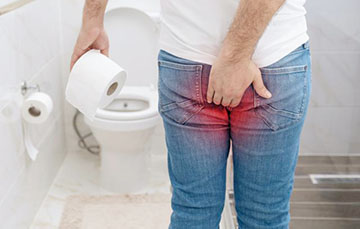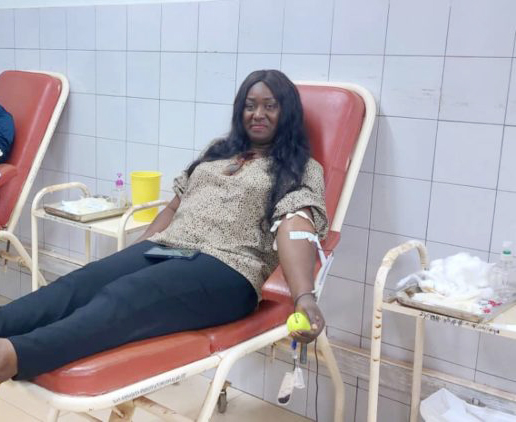Haemorrhoidal crisis: Tips for easing the pain
- Posted on 31/10/2023 15:54
- Film
- By abelozih@sante-education.tg

Extract from the article: Haemorrhoidal attacks, an uncomfortable and painful condition, can disrupt daily life and cause significant discomfort. Understanding the causes, symptoms and means of relief can help you get through this difficult period and minimise recurrences. Wh
Haemorrhoidal attacks, an uncomfortable and
painful condition, can disrupt daily life and cause significant discomfort.
Understanding the causes, symptoms and means of relief can help you get through
this difficult period and minimise recurrences. What are the key aspects of a
haemorrhoidal attack, including how long it lasts, how to soothe it quickly and
recommended eating habits? Explanations from Dr Jean-Claude Bakpatina, General
Practitioner at the Floréal clinic in Lomé.
Haemorrhoidal attacks occur when « the
haemorrhoids, small blood vessels naturally present around the anus, become
irritated, dilated and swollen. Factors
such as constipation, childbirth, genetic predisposition and prolonged use of
the toilet can trigger this painful condition », explains Dr
Jean-Claude Bakpatina, General Practitioner at the Floréal clinic in Lomé.
Typical symptoms of haemorrhoidal attacks
include itching, pain, burning, bleeding and the presence of a painful ball
around the anus.
Duration of a haemorrhoidal attack
According to Dr Jean-Claude Bakpatina,
General Practitioner, « the duration of a haemorrhoidal attack varies
from person to person and can depend on the severity of the symptoms and the
measures taken to manage it. In general, a haemorrhoidal attack lasts from a
few hours to a few days. Symptoms are often more intense at the start of the
attack, then gradually subside ». However, Dr Jean-Claude Bakpatina
shows that in some cases haemorrhoidal attacks can last longer, recurring over
an extended period.
Quick relief from haemorrhoidal attacks
To quickly relieve a haemorrhoidal attack
and alleviate the symptoms, Dr Jean-Claude Bakpatina, General Practitioner,
recommends a few simple measures to follow: gently cleanse the affected area
after each trip to the toilet using lukewarm water and mild soap; avoid rubbing
or using rough toilet paper; creams and suppositories specially designed for
haemorrhoids help to reduce inflammation and relieve pain; consult a health
professional to choose the right product ; eating a diet rich in fibre from
fruit, vegetables and wholegrain cereals can prevent constipation and make
bowel movements easier; drinking enough water throughout the day to maintain
adequate hydration and promote regular bowel movements; taking warm sitz baths
for around 10 to 15 minutes to soothe the anal area and reduce discomfort.
A healthy diet
A balanced diet plays a crucial role in
preventing haemorrhoidal attacks. « To promote intestinal health
and reduce the risk of haemorrhoidal attacks, opt for a diet rich in fibre,
including fruit, vegetables, pulses and wholegrain cereals.Fibre promotes
regular bowel movements and prevents constipation », says the GP.
« Drink enough water to maintain
adequate hydration and facilitate the passage of stools, and avoid spicy meals,
pepper, mustard and alcohol, which can aggravate symptoms. You should also keep
your weight under control, as excess weight can put extra pressure on the anal
region », he continues.
Consult a health professional
Although the measures mentioned above can
help relieve the symptoms of a haemorrhoidal attack, « it is important
to consult a healthcare professional if the symptoms do not improve after a few
days », insists Dr Jean-Claude Bakpatina. In some cases, if the
attacks recur, haemorrhoidal disease can be treated with a minor operation.
Raymond DZAKPATA




